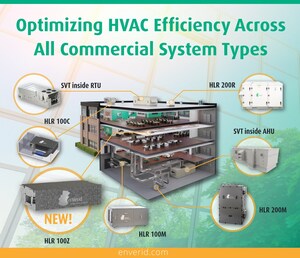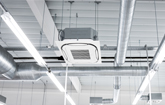WESTWOOD, Mass., June 30, 2020 /PRNewswire/ -- enVerid Systems, provider of intelligent air scrubbers called HVAC Load Reduction® (HLR®) modules, today issued new direction for building owners and mechanical, electrical and plumbing (MEP) professionals for mitigating airborne transmission of the SARS-CoV-2 virus within commercial buildings. enVerid recommends employing an advanced filtration strategy over increased outdoor air ventilation to achieve the same relative risk of infection at a substantially reduced cost. enVerid's findings are based on guidance published by ASHRAE (the American Society of Heating, Refrigerating and Air Conditioning Engineers) and a cost/benefit model it developed to help building owners and engineers assess mitigation approaches and calculate costs. Additionally, when modeling new commercial buildings in New York, Boston and Toronto, enVerid found that increased filtration combined with adherence to ASHRAE's Indoor Air Quality Procedure (IAQP) using air scrubbing technology was highly effective at preventing airborne virus transmission, and could generate significant savings compared to designing for higher ventilation rates.
"In this uncertain time, building owners must balance risk mitigation with soaring operational budgets," said Christian Weeks, enVerid Systems CEO. "Our research found that increasing outside air ventilation to address potential airborne virus transmission is a costly strategy - and in some cases, not a particularly impactful approach. Filtration is more cost-effective than diluting indoor air. Furthermore, our model demonstrates that first costs and long-term operating budgets can be substantially reduced when advanced filtration is combined with ASHRAE's IAQP and air scrubbing technology."
A June 18, 2020 webinar presentation by the Chair of ASHRAE's Epidemic Task Force on Fundamentals of COVID-19 Risk Management stated that "filtration can be a lower energy way to reduce aerosol/airborne infection risk" and "filtration has benefits other than infection control."
enVerid is sharing a white paper today that compiles the latest research on airborne transmission of the SARS-CoV-2 virus. The white paper also includes findings from enVerid's cost/benefit model, built using established scientific data and research to calculate near- and long-term HVAC costs. enVerid assessed two primary strategies for preventing virus transmission in commercial settings: higher levels of filtration vs. increasing outside air ventilation – which dilutes indoor air with a greater percentage of outside air. High-efficiency filters were found to be as effective at preventing the spread of bioaerosols, minuscule airborne droplets that carry the virus, as increased ventilation, and could do so with a far less energy-intensive impact than ventilation. Upgrading current buildings with high-efficiency HVAC filtration to address virus transmission is a simple and immediate solution. For new build and major retrofits, enVerid's models show that when advanced filtration is combined with ASHRAE's IAQP and air scrubbing technology substantial savings can be realized. For example, in an analysis of a 100,0000 ft2 commercial building in New York City using this approach, a savings of $500,000 was projected for combined first cost and 20-year operating cost. [Including chart.]
Additional Health Concerns
enVerid's approach also addresses secondary issues related to SARS-CoV-2 transmission and health concerns: humidity and other air quality issues that may make the virus' impact more severe.
Humidity Control – Many studies have shown that relative humidity (RH) of 40-60% inhibits the spread of viruses. Increased outdoor air ventilation can be counterproductive to maintaining optimal humidity levels, with cold air in the winter dropping humidity below 40% and muggy summer air raising humidity well above 60%.
Air Quality/Pollutant Control – More outside air also brings in pollutants, especially in commercial settings located in cities or near highways. A growing number of studies are examining links between pollution and both the spread and impact of respiratory viruses.
- Fine Particulates - A recent Harvard study showed that a small increase in long-term exposure to PM2.5 (particulate matter measuring 2.5 microns or smaller) leads to a large increase in the COVID-19 death rate. An analysis from Italy found a correlation between an elevated concentration of particulate matter and the high spread and mortality rate of SARS-CoV-2.
- Ozone - Ozone exists in outside air. Additionally, some electronic air cleaners (EAC), including bipolar ionization, produce ozone as a byproduct. Ozone is known to damage the lungs and exacerbate chronic respiratory conditions, and concerns exist that it may inhibit the body's ability to respond to respiratory infections.
- CO2 - The negative effects of poor Indoor Air Quality are not just limited to respiratory concerns. Research from Harvard has specifically pointed to the degradation of cognitive function when CO2 levels rise in indoor air.
"We appreciate enVerid's thorough analysis of alleviating HVAC airborne virus transmission and the associated costs," said David Ellowitz, Project Executive at AHA Consulting Engineers. "Their IAQP strategy and cost/benefit model offer building owners and engineers an effective approach and demonstrated cost savings - a critically important combination as both pandemic and economic concerns are paramount."
HLR Overview
The enVerid HVAC Load Reduction® (HLR®) module is an intelligent air scrubber that removes all indoor air contaminants, including carbon dioxide (CO2), aldehydes and volatile organic compounds (VOCs). HLR technology represents a vital addition to conventional HVAC systems to reduce the heating and cooling load of outside air. Where traditional commercial HVAC designs rely on massive volumes of outside air to maintain indoor air quality, often resulting in a 30 to 50 percent waste in HVAC energy consumption, enVerid products significantly lower upfront system costs and reduce annual energy consumption by up to 30 percent while improving indoor air quality. In 2017, the U.S. Department of Energy ranked enVerid's HLR product as one of the top three energy-saving technologies for commercial buildings, and in 2019 HLR was named the ASHRAE AHR Expo's Product of the Year.
About enVerid Systems, Inc.
enVerid is committed to improving energy efficiency and indoor air quality in buildings worldwide through its innovative, award-winning HVAC Load Reduction® (HLR®) solutions. HLR technology enables immediate capital cost savings on new HVAC systems and provides up to 30% energy savings and superior indoor air quality. Deployed in nearly 10 million ft2 of commercial, academic, and government buildings, enVerid's HLR solution is ASHRAE-compliant, LEED- and WELL-compliant, and eligible for utility rebates. For more information, please visit www.enverid.com.
SOURCE enVerid Systems

Related Links
WANT YOUR COMPANY'S NEWS FEATURED ON PRNEWSWIRE.COM?
Newsrooms &
Influencers
Digital Media
Outlets
Journalists
Opted In





Share this article